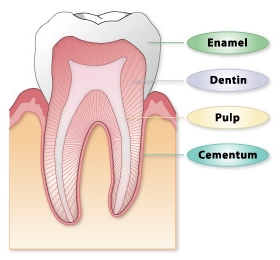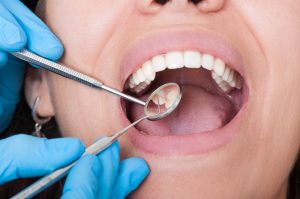 A cracked tooth can be caused by biting into something hard, or could be the result of tooth grinding. Depending on the severity of the crack, symptoms may vary, but generally pain is present when biting (especially when the bite is released) and when a tooth is exposed to temperature changes, such as when you drink a hot beverage or eat ice cream. While changes in temperature tend to always be a problem for those suffering from tooth sensitivity, it should be noted that the pain experienced when a tooth is cracked will be much sharper.
A cracked tooth can be caused by biting into something hard, or could be the result of tooth grinding. Depending on the severity of the crack, symptoms may vary, but generally pain is present when biting (especially when the bite is released) and when a tooth is exposed to temperature changes, such as when you drink a hot beverage or eat ice cream. While changes in temperature tend to always be a problem for those suffering from tooth sensitivity, it should be noted that the pain experienced when a tooth is cracked will be much sharper.
If you’re suffering from this kind of pain, it could be useful if you tried to pinpoint exactly where it’s coming from. Not all cracks are easily visible and trying to establish exactly where the pain is coming from when you’re unable to see any obvious damage to your teeth could help your dentist to treat your problem more easily.
Why Do Tooth Cracks Hurt?

Tooth cracks are painful when the hard layer of a tooth (called dentin) is cracked all the way through, this exposes the softer tissue inside a tooth (called the pulp).
Tooth cracks are painful when the hard layer of a tooth (called dentin) is cracked all the way through, this exposes the softer tissue inside a tooth (called the pulp). Tooth pulp contains all the blood vessels and nerves and can be seen as the living part of a tooth. Exposure of this tissue can be compared to an open wound: in the same way the most outer layer of your skin (the epidermis) is no longer alive, your tooth enamel isn’t alive either. For the most part, living tissues are protected by non-living tissues in the human body. When protective, non-living tissues are damaged, it tends to result in both pain and a higher susceptibility to infection.
Because of this, tooth pulp may also become irritated and inflamed when it’s exposed, which might cause a throbbing pain, especially if the crack isn’t large and the inflamed pulp is confined within the space it would normally occupy when it isn’t swollen. This kind of pressure on the nerves can cause a throbbing pain.
Repairing a Cracked Tooth
Restorative procedures for a cracked tooth will differ depending on factors such as the size of the crack, the health of remaining tissue and the patient’s own choice when presented with treatment options. If a tooth has been damaged beyond repair, as is the case when a crack extends from the top of a tooth all the way into the root, extraction will be the only option; in cases where the crack has not yet gone down into the root, dentists will usually perform a root canal and cover the cracked tooth by making use of a dental crown to protect the remaining tissue. Because cracks tend to spread when they’re left untreated, it’s important to book an appointment with your dentist as soon as possible when you suspect you have a cracked tooth.
 In cases where a tooth has to be extracted, patients are able to choose between various options to replace the missing tooth. Although modern dentistry offers patients many wonderful replacement options, such as the use of dental implants, it’s more pricey than repairing a damaged tooth so delaying an appointment can result in both the loss of your tooth and more expensive treatment.
In cases where a tooth has to be extracted, patients are able to choose between various options to replace the missing tooth. Although modern dentistry offers patients many wonderful replacement options, such as the use of dental implants, it’s more pricey than repairing a damaged tooth so delaying an appointment can result in both the loss of your tooth and more expensive treatment.
Other than booking an appointment as soon as possible to prevent the loss of a tooth, regular dental checkups can also help to fix problems before they become more serious. Checkups enable dentists to find and fix problems that you might not even be aware of, as it’s possible to have damage to a tooth without any pain. While that isn’t often the case, it can happen and when it does, you’ll be saved the misery of a toothache while simultaneously preventing further damage to a tooth in the near future.
Feel free to book an appointment with Dr. Stone if you’re experiencing pain that might be caused by a cracked tooth. Dr. Stone has been practicing as a dentist in Fort Lauderdale for more than thirty years. He specializes in the replacement of missing teeth and fixing broken teeth with dental prosthetics such as dental implants, bridges, dentures, crowns, veneers and dental inlays and onlays. Apart from his team of friendly staff, Dr. Stone also boasts an on-site laboratory at his practice. This helps patients receive the best possible care while reducing treatment time and cost. If your pain is particularly severe, your appointment can be booked as a dental emergency so that you can receive treatment within the same day you called.

